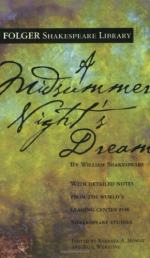|
This section contains 6,979 words (approx. 24 pages at 300 words per page) |

|
SOURCE: “Sexual Politics in A Midsummer Night's Dream,” in Anxious Pleasures: Shakespearean Comedy and the Nation-State, Associated University Presses, 1995, pp. 98-115.
In the following essay, Hall examines the play's treatment of the potential violence inherent in the patriarchal order, represented in A Midsummer Night's Dream by Theseus.
The sexual politics which sets up the dialectic of pleasure and anxiety in A Midsummer Night's Dream is surprisingly violent and frank for a work which still enjoys a reputation for sweet and harmless celebration of the free poetic imagination. In one sense, at least, this familiar sentimentalization is not wrong. The play is deeply concerned with power and poetry, not the sovereign power of poetry but the implications of poetry in sexual politics. The enabling context is the dark underside of the Petrarchan idealism through which Elizabethan court politics was conducted, for the entrusting of the patriarchal inheritance of Henry...
|
This section contains 6,979 words (approx. 24 pages at 300 words per page) |

|


